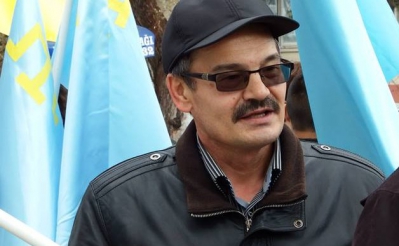So can you annex a country’s territory & jail those who criticize this for ‘separatism’?

The European Court of Human Rights is to determine whether Russia violated the rights of Rafis Kashapov, Russian Tatar activist sentenced to 3 years imprisonment for criticism on social networks of Russia’s invasion and occupation of Crimea. Kashapov is the first person to have been sentenced under the new charges of “public calls to violate Russia’s territorial integrity”. These came into force in May 2014, three months after Russia’s forced annexation of Crimea and it was feared at the time that they could be used against critics of Russia’s actions which have been internationally condemned as in breach of international law.
The application to Strasbourg states that the Russian authorities “have unwarrantedly extended” interpretation of the new article 280.1 of Russia’s Criminal Code by qualifying public expression of the view that Crimea was annexed (“joined” in the original) unlawfully as a public call to separatism. It also asserts that the 3-year sentence under any circumstances was excessive.
Kashapov’s lawyer Damir Gainutdinov told Kommersant that the European Court of Human Rights [ECHR] will effectively be judging whether Russia can punish people for expressing opposition to its annexation of Crimea.
Kommersant only spoke with Russian analysts, whose views would not necessarily be shared by commentators outside the country. Alexander Verkhovsky, Director of the Sova Centre which monitors ‘extremism’ and xenophobia, pointed out that many countries have punishment for separatism, but that in this case ECHR “should assess whether one can punish for calls to it [separatism] if they were not linked to violence”. Rais Suleimanov from the Institute for National Strategy considered Kashapov’s posts “unequivocally separatist”, but thought he shouldn’t face criminal liability if there are no calls to physical violence “even if they clash with the country’s policy”.
While it may be the case that the court in Strasbourg will wish to avoid political considerations, it is not at all obvious that Kashapov’s comments on VKontakte should be classified as ‘calls to separatism’. If statements effectively endorsing the March 27 UN General Assembly Resolution that Crimea remains part of Ukraine are to be viewed as ‘calls to separatism’, then Russia could imprison Russian nationals and probably Ukrainians in Russian-occupied Crimea for repeating statements made by the UN, EU, European Parliament or any number of democratic governments.
57-year-old Kashapov, the Head of the Tatar Public Centre, was arrested on Dec 28, 2014 and has been in custody ever since.
The charges are literally of inciting hatred or enmity (Article 282 § 1 of the Criminal Code) and “public calls to actions aimed at violation of the Russian Federation’s territorial integrity” via the Internet (Article 280.1 § 2). The latter criminalizes what are termed ‘public calls to violate Russian territorial integrity’ with this punishable by 4 years, or 5 if via the Internet.
The 3-year sentence was for four posts on the social network VKontakte, none of which has been removed or blocked. It is possible that Russia’s FSB [Security Service] is happy to leave them there as a warning of what can get you a prison sentence.

There is a brief post entitled Yesterday – Hitler and Danzig, today Putin and Donetsk! It shows pictures of Putin with the caption reading: “Crimea has always been and remains an inalienable part of Russia” and of Hitler saying “Danzig was – and is a German city”.
The text asserts that since Russia’s occupation of Crimea the new unrecognized authorities have been destroying everything Ukrainian and Crimean Tatar.
The text Crimea and Ukraine will be free of the occupiers! reports a demonstration in Ankara with banners reading, “Putin, get out of Crimea!” and calling both Stalin and Putin murderers. The protest, which Kashapov writes was supported by a large group of Crimean Tatars, was against a visit to the Turkish capital by Russian President Vladimir Putin. It criticizes the Turkish authorities for meeting with Putin and says that the latter is following Joseph Stalin’s tradition and carrying out a chauvinistic policy with respect to the Crimean Tatars. He mentions the 18 Crimean Tatars who have disappeared since Russia’s invasion and searches of homes, mosques and religious schools. He speaks of Russian “karateli” – those carrying out punitive operations and a term regularly used on Russian television but about Ukrainians.
In the post “Let’s defend Ukraine and the entire Turkic world!” Kashapov suggests among other things that Putin needs a victory over the Ukrainian people in order to remain in power. He says that Putin’s plan is to crush the Ukrainian revolution, destabilize the situation, etc. In short, roughly similar to what any number of analysts regularly write and exactly the position put in the report Putin. War that Boris Nemtsov was planning to write when he was gunned down outside the Kremlin in Feb 2015.
One final entry has a photo collage with the title “Where there’s Russia, there are tears and death”. The photos are from conflict in Moldova; Chechnya; Dagestan; Georgia and Ukraine.
An ‘expert assessment’ asserted that Kashapov’s texts deliberately stir up hatred to the following: “Russians”; “Russian authorities”, the Crimean “occupation authorities”; “President Vladimir Putin”.
The Sova Centre, on the contrary, found no grounds for the accusations against Kashapov who has been recognized as a political prisoner by the Memorial Human Rights Centre.





